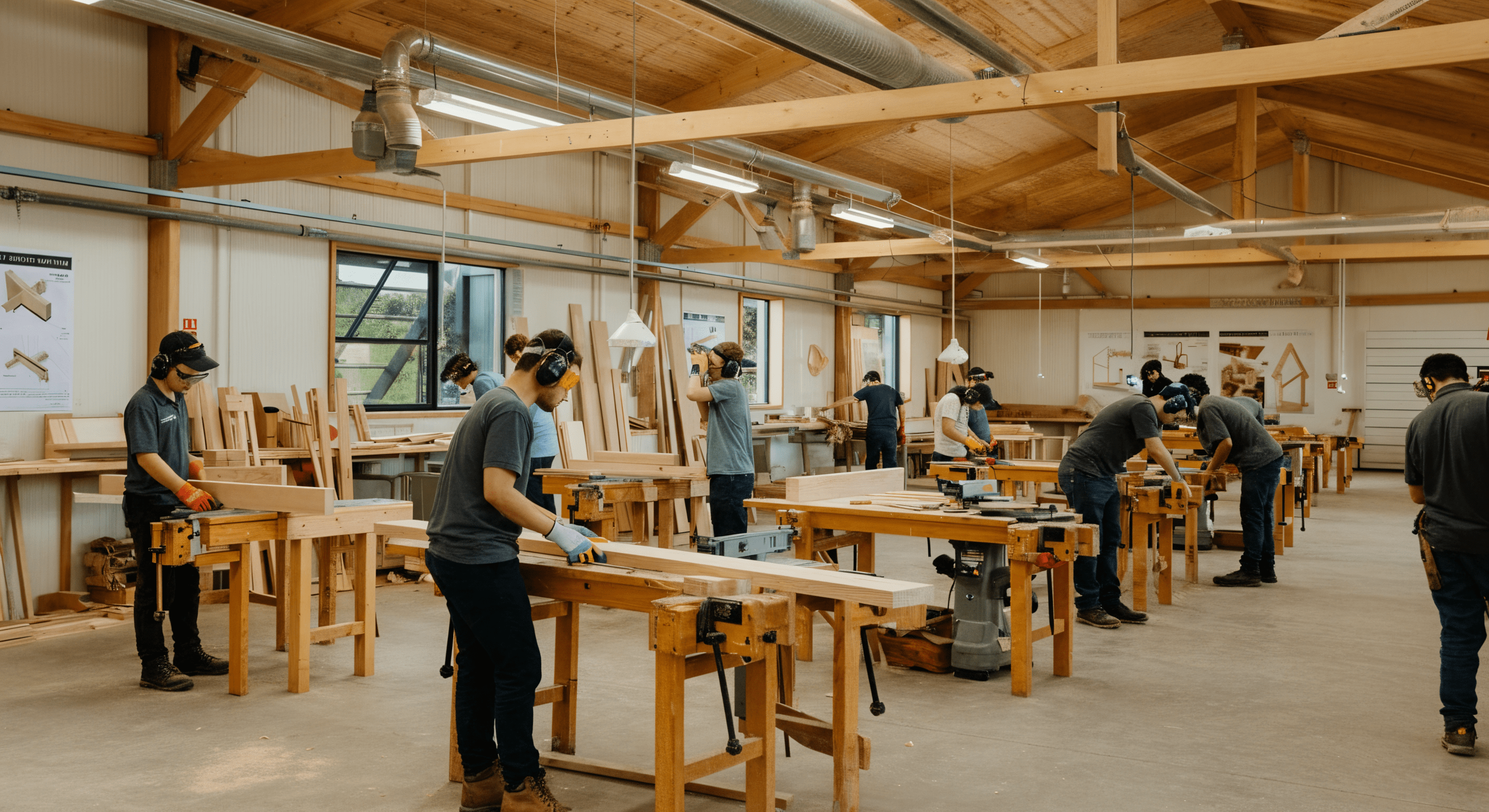Carpentry is a highly rewarding and practical career choice in New Zealand. It offers a clear pathway to becoming a skilled tradesperson. Various trade schools and institutions nationwide provide recognised qualifications that equip students with the essential skills to succeed. This article explores the training options available for aspiring carpenters, with insights into institutions, programmes, and apprenticeship pathways.
Entry-Level Qualifications: New Zealand Certificate in Construction Trade Skills (Level 3)
Several institutions offer the New Zealand Certificate in Construction Trade Skills (Level 3), a one-year full-time course (34 teaching weeks). Upon completion, students can join the workforce as apprentice carpenters or pursue further studies. Institutions offering this qualification include:
Unitec Institute of Technology
- Programme: New Zealand Certificate in Construction Trade Skills (Level 3) with a strand in Carpentry
- Overview: This course equips students with foundational carpentry skills, preparing them for apprenticeships or entry-level roles. Graduates may also progress to the New Zealand Certificate in Carpentry (Level 4).
Manukau Institute of Technology (MIT)
- Programme: New Zealand Certificate in Construction Trade Skills (Level 3) with a strand in Carpentry
- Overview: This program is designed as a pre-trade course. It provides essential carpentry skills and includes practical projects to enhance learning.
New Zealand Management Academy (NZMA)
- Programme: Certificate in Carpentry Trade Skills (Level 3)
- Overview: This 32-week course focuses on basic carpentry skills, including timber-framed construction, providing hands-on experience for entry-level roles or apprenticeships.
Toi Ohomai Institute of Technology
- Programme: New Zealand Certificate in Construction Trade Skills (Level 3) with a strand in Carpentry
- Overview: This program focuses on practical skills through projects like building a house on campus, preparing students for entry-level positions in construction.
Advanced Training: New Zealand Certificate in Carpentry (Level 4)
This qualification typically takes 3-4 years to complete, often in conjunction with an apprenticeship. It provides advanced carpentry skills and knowledge, preparing students for trade-qualified careers in the construction industry. Institutions offering this programme include:
Unitec Institute of Technology
- Programme: New Zealand Certificate in Carpentry (Level 4)
- Overview: This programme combines hands-on experience with advanced training and includes building projects from start to finish. Graduates can enhance their career prospects by joining professional organisations like the Registered Master Builders Association.
Builders Academy
- Programme: New Zealand Certificate in Carpentry (Level 4)
- Overview: Builders Academy offers a managed apprenticeship program that typically takes 3 to 4 years. It combines on-the-job training with classroom learning, covering essential carpentry skills such as site establishment, framing, roofing, and interior finishing. Graduates are prepared for careers as qualified carpenters in various sectors and can pursue further qualifications to become Licensed Building Practitioners.
Special Programmes for Māori and Pasifika
Specialised initiatives such as He Toki offer free training for Māori and Pasifika individuals aged 16-40. These programmes combine practical carpentry training with a culturally supportive learning environment, helping participants gain Level 3 qualifications and confidently enter the workforce.
Other Programmes
Whitireia and Wellington Institute of Technology (WelTec)
- Programme: Construction Trade Skills (Level 3) Carpentry
- Overview: This course focuses on real-world projects, including building homes, and emphasises teamwork and practical skills.
Southern Institute of Technology (SIT)
- Programme: Pre-trade Carpentry Course
- Overview: This one-year course includes practical projects such as collaborative housebuilding and requires work experience within the industry.
Online Learning Opportunities
Online learning offers flexibility and accessibility for those unable to attend in-person classes. Institutions such as the Open Polytechnic of New Zealand and Learning Cloud New Zealand provide virtual courses tailored to students’ schedules. Additionally, BCITO supports apprenticeships with blended learning models, ensuring students receive quality training even with non-traditional attendance.
General Entry Requirements
To enrol in carpentry programmes, applicants generally need to meet the following criteria:
- Age Requirement: Minimum age of 16 years.
- Citizenship or Residency: Must be New Zealand citizens or permanent residents
- Physical Capability: Performing construction tasks, such as lifting and prolonged standing.
- English Language Proficiency: Evidence of English proficiency for non-native speakers, typically an IELTS score of 5.5 (General Training) or 5 with no band lower than 5.
- Educational Background: Completion of NCEA Level 2 with specific credits in English and Mathematics or equivalent pre-apprenticeship qualifications.
Apprenticeship Pathway and Career Prospects
To become a qualified carpenter in New Zealand, students typically complete an apprenticeship under the guidance of experienced builders. Managed by the Building and Construction Industry Training Organisation (BCITO), these apprenticeships offer practical experience and improve employability.
- Duration: Approximately 3-4 years.
- Requirements: Pre-trade education and proficiency in mathematics and English.
Qualified carpenters earn competitive salaries, typically from NZ$65,000 to NZ$75,000 annually. With Carpentry listed on New Zealand’s Skills Shortage and Green Lists, the profession offers excellent opportunities for both domestic and international candidates.
Key Considerations for Carpentry Training
Costs: Tuition fees vary across institutions. Scholarships and financial aid options are often available to eligible students. For example:
- MIT: Approximately NZ$7,700 for domestic students.
- NZMA: Around NZ$25,000 for international students.
Practical Experience: Many programmes include real-world projects, such as building houses, to ensure hands-on learning.
Conclusion
With diverse educational pathways and a strong demand for skilled carpenters, a career in Carpentry offers stability and growth in New Zealand. Whether through trade schools, apprenticeships, or online courses, aspiring carpenters can find the right programme to achieve their goals. Explore your options today to embark on a fulfilling and impactful career in Carpentry.




